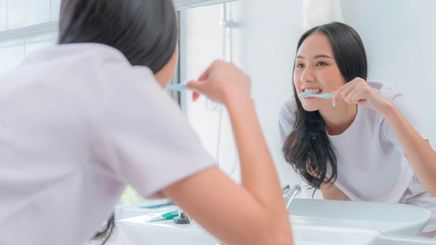
You're getting ready for an important meeting or a long-awaited date night, and suddenly, it hits you: bad breath! Brushing your teeth is the best way to tackle this issue, but maybe you're tight on time or don't want to risk ruining your outfit. Can mouthwash get the job done?
With the promise of killing bacteria and providing an instant blast of freshness, a mouth rinse seems like a no-brainer fix. It's quick and convenient, especially when you're pressed for time. However, mouthwash should not replace brushing and flossing (or a visit to the dentist, for that matter). Instead, treat it like a trusty sidekick to your oral care. Here’s why.
The Pros of Using Mouthwash
Mouthwash is vital to because the liquid form can reach nooks and crannies that a toothbrush or floss may struggle with, according to the American Dental Association (ADA). This is critical, especially if you have undergone an oral procedure or are managing conditions like bad breath, gum disease, or tooth decay.
However, many mouth rinses are what dentists would classify as cosmetic, meaning they offer temporary breath freshness but lack lasting effects.
To fight bacteria, your mouthwash must contain active ingredients, such as:
- Fluorides
- Chlorhexidine
- Cetylpyridinium Chloride
- Povidone-Iodine (PVP-I)
- Stannous Chloride
- Essential oils like menthol, eucalyptol, and thymol
The Downside of Using Mouthwash
Recently, research has caused some concern regarding the use of alcohol-based gargles. Although effective against bacteria, it can dry the mouth, which can result in oral problems. Saliva keeps the oral cavity clean. Without moisture, you're looking at –surprise –bad breath and cavities. Dentists advise switching to an alcohol-free mouthwash if dry mouth becomes an issue.
What Makes a Well-Rounded Oral Care Routine?
The real downside to using mouthwash is when it becomes a lazy go-to substitute for primary oral care. Diligent brushing and flossing twice daily are still the foundation of healthy teeth. When done correctly, these two stars can banish leftover food particles, the culprits behind bad breath and plaque bacteria, and leave you with fresh breath.
Try closeup Red Hot Toothpaste, which acts as ticks all your oral care needs. This multitasker has Antibacterial Zinc that can kill 99% of germs (as per a lab test on select bacteria) and keep your breath fresh for up to 12 hours with regular use. Want a more minty fresh flavor? Use closeup Gel Toothpaste with Antibacterial Zinc Menthol Fresh, which delivers the same benefit in a menthol formula.
When And How to Use Mouthwash
Technically, you can do without mouthwash if you have healthy teeth, gums, and proper oral care. But it can offer an extra layer of protection, especially when you're battling mouth infections. Consider these points if you're looking to maximize the benefits of mouthwash.
- Ask your dentist about timing. While many experts suggest using mouthwash after brushing and flossing, some caution that it can wash away the fluoride from your toothpaste and advise rinsing at a different time of day.
- Stick to the recommended amount on the label. Overdoing the rinsing can disrupt the natural balance of your mouth's bacteria.
- Swish, don't gargle. Take a sip of mouthwash and swish it around your mouth for about 30 seconds. And please, don’t let it sit in your mouth for too long!
Daily mouthwash offers a refreshing boost to your oral hygiene routine, promising improved breath and bacteria control. But it only plays a supporting role. Oral health's real stars – toothbrush, toothpaste, dental floss, and regular visits with your dentist – are the ones that will leave you smiling confidently every day.